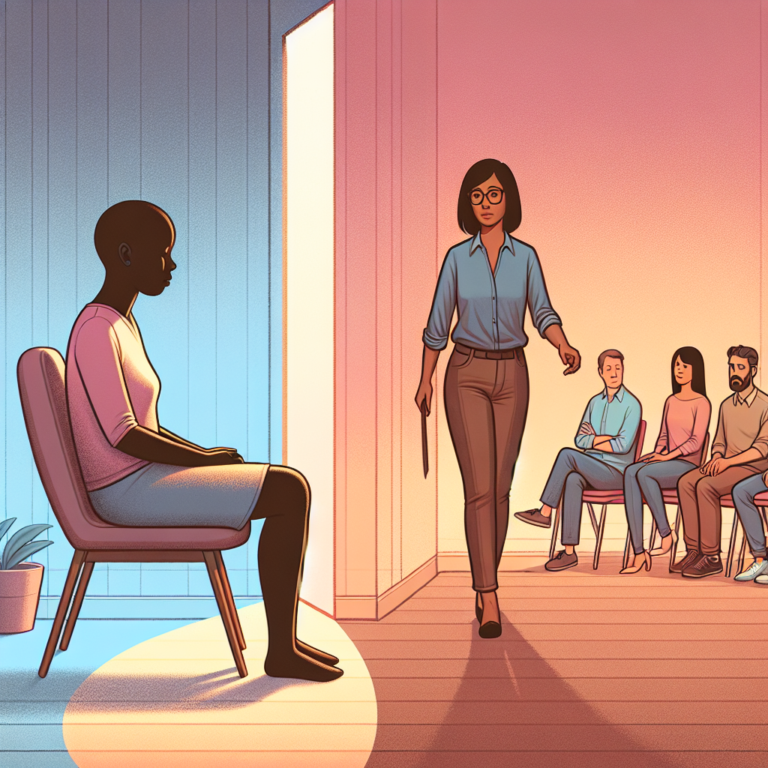
Couples Counseling in Your Living Room: The Ultimate Shift to Online Therapy
Introduction
Imagine this: you’re sitting comfortably in your living room, a cup of tea in hand, discussing your relationship challenges with a professional therapist. This scenario is no longer a novelty, thanks to the rise of online therapy. In recent years, there has been a significant shift in how couples approach counseling, making it more accessible than ever. The emergence of platforms that provide couples counseling in your living room signifies a profound change in the therapeutic landscape, moving away from traditional face-to-face sessions.
As people continue to navigate the complexities of relationships, the importance of effective communication and support is paramount. This article delves into the evolution of couples counseling and the undeniable benefits of the online model. Through insightful case studies, data representation, and actionable advice, we significantly explore the immense value of receiving couples counseling in your living room.
The Evolution of Couples Counseling
The Traditional Therapy Model
Historically, couples counseling often took place in sterile, neutral offices, creating an environment that could sometimes feel intimidating. Couples would travel to appointments, usually scheduling them around their busy lives, which often added stress to an already challenging situation. The traditional method worked for many, but it was not without its complications.
The Digital Revolution
With the advent of technology, the therapy landscape began to change. The internet revolutionized almost every industry, and mental health services were no exception. The introduction of telehealth allowed for more flexible scheduling, ease of access, and the ability to connect from the comfort of home. The COVID-19 pandemic accelerated this trend, as in-person meetings became impractical, leading a majority of therapists to pivot to online platforms.
Couples Counseling in Your Living Room
Now, couples counseling is more accessible. Couples can engage in therapy from their living rooms, creating a comfortable and personal environment. This shift presents unique benefits and opportunities to explore deep-seated issues without the discomfort that a physical office might impose.
Benefits of Online Couples Counseling
Convenience and Accessibility
Online therapy manifests unparalleled convenience. It eliminates barriers such as travel time and geographical restrictions. This means couples in rural areas or those with mobility issues can find qualified therapists without the stress of travel. Moreover, the flexible scheduling fits better into busy lifestyles.
Let’s look at a case study:
Case Study 1: The Johnsons’ Journey
Background: Mary and Tom Johnson, a couple in their mid-thirties, faced challenges due to busy work schedules and childcare responsibilities.
Challenge: Finding time to attend therapy sessions was daunting.
Solution: They turned to online counseling during the pandemic.
Outcome: They found that being at home made them feel more relaxed, encouraging open discussion. After 12 sessions, they reported improved communication and conflict resolution skills.
Cost-Effectiveness
Online therapy often comes with reduced costs compared to traditional face-to-face sessions. Without the overhead from physical office spaces, therapists can offer lower fees, making counseling more financially accessible.
Table 1: Cost Comparison of Traditional vs. Online Therapy
| Type of Counseling | Average Cost per Session | Insurance Acceptance | Travel Required |
|---|---|---|---|
| Traditional Counseling | $100 – $250 | Often accepted | Yes |
| Online Counseling | $50 – $150 | Frequently accepted | No |
Enhanced Comfort and Safety
For many, the living room setting can be less intimidating than a clinical environment. Couples can engage in discussions while surrounded by familiar objects, making it easier to express feelings and share vulnerabilities. This comfort can lead to more productive therapy sessions.
Case Study 2: The Smiths’ Transformation
Background: Alex and Jamie Smith were hesitant to seek help due to past negative therapy experiences. They decided to pursue online counseling.
Challenge: They struggled with effective communication about financial concerns.
Solution: Online therapy sessions helped them ease into discussions in their comfortable environment.
Outcome: They learned how to navigate sensitive topics without fear of judgment, ultimately improving their relationship dynamics.
Anonymity and Reduced Stigma
Online therapy can help alleviate the stigma surrounding mental health services. Couples may feel more comfortable seeking help when they can do so from a private space, reducing the anxiety that often accompanies therapy.
Wider Range of Therapists
Thanks to the internet, couples are no longer limited to therapists in their geographical area. They can select from a broader spectrum of qualified professionals and specializations, ensuring a better match for their particular needs.
Challenges of Couples Counseling in Your Living Room
While the advantages are plenty, online therapy is not without its drawbacks.
Technological Barriers
Some couples may face difficulties with technology, whether it’s poor internet connections or unfamiliarity with telehealth platforms. It may create frustrations that can interfere with the therapy process.
Lack of Non-Verbal Cues
In face-to-face interactions, therapists can pick up on non-verbal cues such as body language and facial expressions. Online therapy may impede this aspect, making it harder for therapists to fully understand the nuances of a couple’s communication patterns.
The Challenge of Privacy
Given that counseling occurs in personal spaces, issues of privacy may arise. Couples should ensure they have a quiet, private setting that minimizes distractions or interruptions.
Best Practices for Couples Counseling Online
To maximize the effectiveness of online couples therapy, consider these best practices:
1. Choose the Right Space
Select a quiet, comfortable room with minimal interruptions. Ensure good lighting and a stable internet connection to facilitate an effective session.
2. Ensure Preparedness
Approach therapy as you would an in-person session. Have your materials ready and be in the right mindset to engage in the process.
3. Invest in Technology
Utilize quality devices and platforms that enhance the therapy experience. Headphones and a stable camera can improve communication, allowing for clearer exchange.
4. Foster Communication
Maintain open communication not just with your partner but also with the therapist. Provide feedback on what works and what doesn’t, fostering a collaborative environment.
5. Take Breaks
Online therapy can sometimes be overwhelming. Scheduling breaks during longer sessions can avoid fatigue and sustain focus.
Couples Counseling in Your Living Room: Inspirational Insights
As couples counseling transitions to an online format, it offers an incredible opportunity for personal growth and relationship enhancement. Let the following points inspire you to invest in your relationship through therapy:
Embrace Vulnerability: Sharing emotions in a safe space fosters connection and intimacy. Online therapy can provide that environment.
Commit to the Process: Couples counseling is not an instant fix but a journey of discovery and healing. Trust the process.
Celebrate Progress: Recognize and celebrate small victories. Every step taken in therapy is a testament to your commitment to improving your relationship.
Practice Open Communication: Utilize the skills you learn in therapy to engage in healthy conversations even when not in a session.
- Seek Continuous Growth: Embrace the fact that relationships require ongoing effort. Online therapy can be a continuous resource for growth.
Conclusion
The shift to online therapy marks a revolution in couples counseling, allowing couples to engage in therapy in their own living rooms. With the right approach, couples counseling in your living room can lead to profound changes and strengthened connections. By understanding the benefits and challenges, as well as best practices, couples can harness this powerful tool to navigate their relationship journeys.
Whether you’re considering couples counseling as a preventative measure or a solution to ongoing challenges, know that the path to stronger communication and healthier relationships can be begun from the comforts of home. Engage in the process wholeheartedly, and you may find that the comfort of your living room can be transformative for your relationship.
FAQs
1. What is couples counseling, and how does it work online?
Couples counseling is a form of therapy designed to help couples address their relationship issues. Online counseling enables couples to connect with therapists through video or chat platforms, allowing for flexible and accessible sessions.
2. Is online couples counseling as effective as in-person therapy?
Research shows that online therapy can be just as effective as in-person therapy. The key is finding the right therapist and maintaining an open line of communication.
3. How do I choose the best online therapist for couples counseling?
Look for therapists who specialize in couples therapy and have positive reviews. Ensuring a good fit through a preliminary meeting or consultation can also help establish a compatible therapeutic relationship.
4. What are some common topics addressed in couples counseling?
Common topics include communication issues, conflict resolution, financial stress, intimacy concerns, and trust issues. Online counseling allows for these discussions in a comfortable environment.
5. How do I ensure my online counseling sessions remain confidential?
Choose a therapist who uses secure, HIPAA-compliant platforms for sessions. Additionally, create a private, quiet space for your sessions to minimize interruptions or eavesdropping.
In conclusion, the emergence of online couples counseling in your living room symbolizes a profound change in how couples can navigate their relationships. With the comfort, accessibility, and flexibility it brings, couples can embark on a transformative journey towards better communication and deeper connections, all from the convenience of their home.














